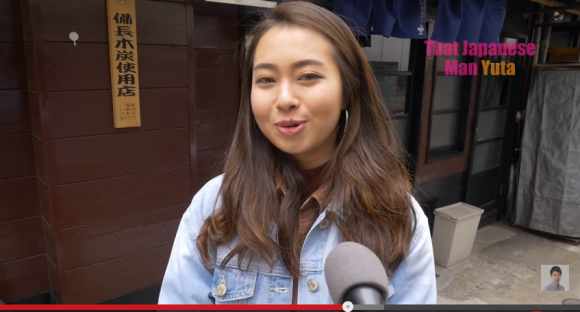
Much has been written about the experience of being a Western-looking foreigner in Japan. But what is the situation like for foreigners of Asian backgrounds?
Here on SoraNews24, we’ve talked about some of our individual experiences being foreigners in Japan. Often, foreigners in Japan report encountering different situations as a result of how they might initially appear to Japanese people. For example, while Western-looking foreigners may get preferential treatment in some areas (or they may get ignored in others), Asian-background foreigners may find they naturally encounter an entirely different set of experiences from their Western-looking friends. With different expectations placed upon them, they can find navigating life in Japan to have various unique benefits and challenges. YouTuber That Japanese Man Yuta recently uploaded a pair of videos taking a look at the perspectives of both female and male Asian foreigners living in Japan.
Let’s start with the ladies!
A major issue for both gender groups was the difficulty encountered in describing their particular backgrounds. Japan is an ethnically homogeneous nation, and simply being born in Japan is not enough to grant Japanese citizenship, since Japan, unlike some countries, only recognizes jus sanguinis (right of blood), and not jus soli (right of soil). As a result, it can be a challenge for some people raised in Japan to fully grasp concepts such as “fourth-generation Japanese American” or “American-born Vietnamese”.
Language issues were also discussed by the ladies, with one interviewee saying that restaurant staff exclusively focus on her even when she is with Caucasian friends who speak better Japanese (a concept that we’ve discussed before!).
And now on to the men.
One significant difference the guys discussed in detail was how they are held to higher expectations when it comes to speaking Japanese. While some Japanese people may be quick to praise Western-looking foreigners for mastering basic Japanese greetings, Westerners of Asian appearance can find their language skills either overly scrutinised, or celebrated less.
Another key difference is in approachability. Some of the interviewees stated that they felt Japanese people were “more at ease” around them, especially when it came to speaking English. Additionally, one U.S.-born interviewee whose parents are from Pakistan said that he felt Japanese people were more at ease speaking English with him than they would be around a blond, blue-eyed, tall and more “stereotypical-looking” foreigner.
The interviews certainly raise some important issues that occur when living in Japan as a foreigner who doesn’t fit the typical mold of a “gaijin”. What are your thoughts?
Source, images: YouTube/That Japanese Man Yuta 1,2

 Here’s what Japanese people think of Hollywood’s recent “whitewashing”【Video】
Here’s what Japanese people think of Hollywood’s recent “whitewashing”【Video】 Japanese people give their thoughts on Gaijin Hunters/English Vampires
Japanese people give their thoughts on Gaijin Hunters/English Vampires Do Japanese People Want Refugees in Japan?【VIDEO】
Do Japanese People Want Refugees in Japan?【VIDEO】 What do Japanese people think of Black- and Asian-Americans?【Video】
What do Japanese people think of Black- and Asian-Americans?【Video】 What do Japanese people think of “weeaboos”?【Video】
What do Japanese people think of “weeaboos”?【Video】 Seaside scenery, history, and so many desserts on Yokohama’s Akai Kutsu【Japan Loop Buses】
Seaside scenery, history, and so many desserts on Yokohama’s Akai Kutsu【Japan Loop Buses】 Foreigner’s request for help in Tokyo makes us sad for the state of society
Foreigner’s request for help in Tokyo makes us sad for the state of society Japanese city loses residents’ personal data, which was on paper being transported on a windy day
Japanese city loses residents’ personal data, which was on paper being transported on a windy day Should you add tartar sauce to Japanese curry rice? CoCo Ichi makes diners an unusual offer
Should you add tartar sauce to Japanese curry rice? CoCo Ichi makes diners an unusual offer Red light district sushi restaurant in Tokyo shows us just how wrong we were about it
Red light district sushi restaurant in Tokyo shows us just how wrong we were about it Ghibli Park now selling “Grilled Frogs” from food cart in Valley of Witches
Ghibli Park now selling “Grilled Frogs” from food cart in Valley of Witches Japanese ramen restaurants under pressure from new yen banknotes
Japanese ramen restaurants under pressure from new yen banknotes Smash Bros. director Sakurai stabs Kirby in the face, has delicious justification for it
Smash Bros. director Sakurai stabs Kirby in the face, has delicious justification for it Amazing exhibition of Japan’s legendary “cursed katana” is going on right now【Photos】
Amazing exhibition of Japan’s legendary “cursed katana” is going on right now【Photos】 The madness ends now: How to conqueror impossible-to-open Japanese convenience store snacks
The madness ends now: How to conqueror impossible-to-open Japanese convenience store snacks McDonald’s new Happy Meals offer up cute and practical Sanrio lifestyle goods
McDonald’s new Happy Meals offer up cute and practical Sanrio lifestyle goods French Fries Bread in Tokyo’s Shibuya becomes a hit on social media
French Fries Bread in Tokyo’s Shibuya becomes a hit on social media Studio Ghibli releases new action figures featuring Nausicaä of the Valley of the Wind characters
Studio Ghibli releases new action figures featuring Nausicaä of the Valley of the Wind characters New private rooms on Tokaido Shinkansen change the way we travel from Tokyo to Kyoto
New private rooms on Tokaido Shinkansen change the way we travel from Tokyo to Kyoto Tokyo Tsukiji fish market site to be redeveloped with 50,000-seat stadium, hotel, shopping center
Tokyo Tsukiji fish market site to be redeveloped with 50,000-seat stadium, hotel, shopping center Beautiful Ghibli sealing wax kits let you create accessories and elegant letter decorations【Pics】
Beautiful Ghibli sealing wax kits let you create accessories and elegant letter decorations【Pics】 Studio Ghibli releases Kiki’s Delivery Service chocolate cake pouches in Japan
Studio Ghibli releases Kiki’s Delivery Service chocolate cake pouches in Japan New definition of “Japanese whiskey” goes into effect to prevent fakes from fooling overseas buyers
New definition of “Japanese whiskey” goes into effect to prevent fakes from fooling overseas buyers Our Japanese reporter visits Costco in the U.S., finds super American and very Japanese things
Our Japanese reporter visits Costco in the U.S., finds super American and very Japanese things All-you-can-drink Starbucks and amazing views part of Tokyo’s new 170 meter-high sky lounge
All-you-can-drink Starbucks and amazing views part of Tokyo’s new 170 meter-high sky lounge More foreign tourists than ever before in history visited Japan last month
More foreign tourists than ever before in history visited Japan last month New Pokémon cakes let you eat your way through Pikachu and all the Eevee evolutions
New Pokémon cakes let you eat your way through Pikachu and all the Eevee evolutions Disney princesses get official manga makeovers for Manga Princess Cafe opening in Tokyo
Disney princesses get official manga makeovers for Manga Princess Cafe opening in Tokyo Sales of Japan’s most convenient train ticket/shopping payment cards suspended indefinitely
Sales of Japan’s most convenient train ticket/shopping payment cards suspended indefinitely Sold-out Studio Ghibli desktop humidifiers are back so Totoro can help you through the dry season
Sold-out Studio Ghibli desktop humidifiers are back so Totoro can help you through the dry season Japanese government to make first change to romanization spelling rules since the 1950s
Japanese government to make first change to romanization spelling rules since the 1950s Ghibli founders Toshio Suzuki and Hayao Miyazaki contribute to Japanese whisky Totoro label design
Ghibli founders Toshio Suzuki and Hayao Miyazaki contribute to Japanese whisky Totoro label design Doraemon found buried at sea as scene from 1993 anime becomes real life【Photos】
Doraemon found buried at sea as scene from 1993 anime becomes real life【Photos】 Tokyo’s most famous Starbucks is closed
Tokyo’s most famous Starbucks is closed One Piece characters’ nationalities revealed, but fans have mixed opinions
One Piece characters’ nationalities revealed, but fans have mixed opinions We asked a Uniqlo employee what four things we should buy and their suggestions didn’t disappoint
We asked a Uniqlo employee what four things we should buy and their suggestions didn’t disappoint Princesses, fruits, and blacksmiths: Study reveals the 30 most unusual family names in Japan
Princesses, fruits, and blacksmiths: Study reveals the 30 most unusual family names in Japan What Japanese women really think about the gender gap in Japan【Video】
What Japanese women really think about the gender gap in Japan【Video】 Do young Japanese women want to be housewives?【Interview】
Do young Japanese women want to be housewives?【Interview】 Here’s what Japanese men and women think about cheating【Video】
Here’s what Japanese men and women think about cheating【Video】 Study reveals staff shortage in Japanese firms, suggests a need to accept low-skilled foreigners
Study reveals staff shortage in Japanese firms, suggests a need to accept low-skilled foreigners Are Japan’s efforts at internationalization succeeding or not?
Are Japan’s efforts at internationalization succeeding or not? Westerners in Japan – do they really ALL speak English? 【Video】
Westerners in Japan – do they really ALL speak English? 【Video】 Japanese YouTuber joins calls to delete Logan Paul’s YouTube account 【Video】
Japanese YouTuber joins calls to delete Logan Paul’s YouTube account 【Video】 Getting stopped by the police in Japan – how often does it happen (and why?)
Getting stopped by the police in Japan – how often does it happen (and why?) Do Japanese people kiss in Public? 【Interview】
Do Japanese people kiss in Public? 【Interview】 Japanese prefectural governor wants foreign tourists to pay special extra fee
Japanese prefectural governor wants foreign tourists to pay special extra fee Over 30 percent of surveyed Japanese managers feel intense stress from working with foreigners
Over 30 percent of surveyed Japanese managers feel intense stress from working with foreigners Permanent Japanese residency to be possible for foreigners with anime-related jobs after one year
Permanent Japanese residency to be possible for foreigners with anime-related jobs after one year Five Japanese misconceptions about foreign male/Japanese female couples
Five Japanese misconceptions about foreign male/Japanese female couples Does the experience of living in Japan make you a better person? The good, bad and ugly
Does the experience of living in Japan make you a better person? The good, bad and ugly Japanese Twitterers share entertaining anecdotes of their experiences with foreigners
Japanese Twitterers share entertaining anecdotes of their experiences with foreigners This private island in the Pacific Ocean is open to guests – but only Japanese ones
This private island in the Pacific Ocean is open to guests – but only Japanese ones “I’m glad I’m Japanese” posters in Kyoto spark outrage among Japanese Twitter users
“I’m glad I’m Japanese” posters in Kyoto spark outrage among Japanese Twitter users
Leave a Reply